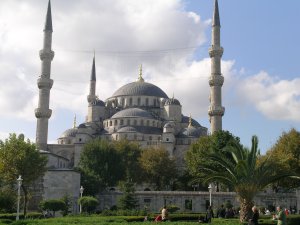Presented By: Classical Studies
A league of universal monarchies – recontextualising Rome in world history
Peter Fibiger Bang - University of Copenhagen

In person: 2175 Angell Hall, Classical Studies Library
Online, Zoom webinar registration: https://umich.zoom.us/webinar/register/WN_5XYfunWrRCSTaWxuGKmojw
Summary: This paper sets out in search of a new world history context for Rome. Traditionally world history was seen as a function of European history, leaving most of the world standing idle on the side-line. This view has long since collapsed, but a new image of world history has yet to take its place. While the Roman Empire nested snuggly in a story that saw history progress through stages of European development, from antiquity till the present, its position was nevertheless characterised by a paradox. From A European perspective, Rome, the pan-Mediterranean empire, was an anomaly, an exception. But, while Rome the universal empire find few parallels in later European history, dominated by middling-sized states, it fits into a wider and dynamic comparative history of grand imperial monarchies, ranging across the pre-industrial Afro-Eurasian world. This is the new world history context against which we should explore the Greco-Roman experience.
Peter Fibiger Bang, PhD (Cantab), Dr. Phil (Haf) is Associate Professor at the Saxo Institute (history), University of Copenhagen. He has worked extensively on Roman economic and comparative imperial history. Among his many books are: The Roman Bazaar (CUP 2008), Universal Empire (co-edited with D. Kolodziejczyk, CUP 2012) and most recently The Oxford World History of Empire, 2 vols. (co-edited with C. A. Bayly & W. Scheidel, OUP 2021)
Online, Zoom webinar registration: https://umich.zoom.us/webinar/register/WN_5XYfunWrRCSTaWxuGKmojw
Summary: This paper sets out in search of a new world history context for Rome. Traditionally world history was seen as a function of European history, leaving most of the world standing idle on the side-line. This view has long since collapsed, but a new image of world history has yet to take its place. While the Roman Empire nested snuggly in a story that saw history progress through stages of European development, from antiquity till the present, its position was nevertheless characterised by a paradox. From A European perspective, Rome, the pan-Mediterranean empire, was an anomaly, an exception. But, while Rome the universal empire find few parallels in later European history, dominated by middling-sized states, it fits into a wider and dynamic comparative history of grand imperial monarchies, ranging across the pre-industrial Afro-Eurasian world. This is the new world history context against which we should explore the Greco-Roman experience.
Peter Fibiger Bang, PhD (Cantab), Dr. Phil (Haf) is Associate Professor at the Saxo Institute (history), University of Copenhagen. He has worked extensively on Roman economic and comparative imperial history. Among his many books are: The Roman Bazaar (CUP 2008), Universal Empire (co-edited with D. Kolodziejczyk, CUP 2012) and most recently The Oxford World History of Empire, 2 vols. (co-edited with C. A. Bayly & W. Scheidel, OUP 2021)